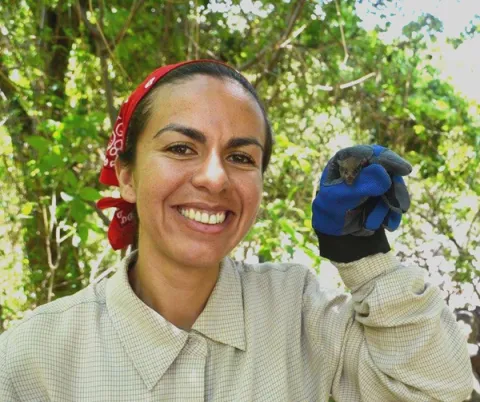About the project
Bats are key pollinators in both natural and agricultural ecosystems providing important pollination services. However, bats are often considered pests and research quantifying their importance as pollinators is scarce. In this PhD project, you will determine the effectiveness of bat-pollination for agave plants, a major crop in Mexico, and will quantify the market value and benefit distribution of bat pollination for mezcal, one of the most important products obtained from agave.
Pollination is one of the most important processes for the functioning of ecosystems and for food security and bats are amongst the most important vertebrate pollinators. Bats also pollinate many plants of high socio-economic value across the tropics.
Our lab, we made the first assessment of the market value of bat pollination services of a major fruit crop in Mexico (pitayas, fruits from a columnar cacti). We showed that this service is worth US$2,500 per ha, with bats contributing around 40% of gross income across producers.
In this PhD project, you will build new evidence to our previous work on the socio-economic importance of bat pollination services.
Objectives of this project include:
- Quantify the effect of bat pollination on agave plants.
- Use yield analysis to assess the market value of this service in the mezcal (an alcoholic beverage obtained from agave plants) industry in Mexico.
- Extrapolate your results and those from our previous work, to estimate bat pollination services at national level using the TESSA tool: https://www.ipbes.net/policy-support/tools-instruments/toolkit-ecosystem-service-site-based-assessment-tessa-v20.
You will be part of an interdisciplinary team of leading experts on wildlife ecology and conservation.
Your work will yield major advances in incorporating the value of indirect ecosystem services, such as pollination, into market value to support conservation and management decisions. Most data collection is expected to be in the field, where you will have the opportunity to work with bats, wild and cultivated plants, and with local communities and different stakeholders.
You will learn several complementary skills, including:
- biodiversity monitoring techniques
- animal and plant taxonomy
- animal handling
- qualitative research methods
- outreach strategies
There will be opportunities to develop your own research ideas to pursue during your PhD as you grow as a scientist.

